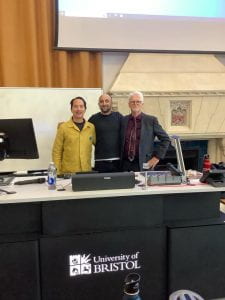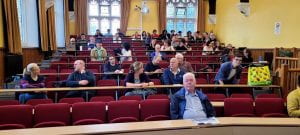Richard Arthur is Emeritus Professor of Philosophy at McMaster University in Ontario. His research interests are in early modern natural philosophy and mathematics, and the foundations of physics, with special attention to the theory of time and the infinite. He visited the University of Bristol as a Benjamin Meaker Distinguished Visiting Professor for September and part of October 2023 at the invitation of Dr. Karim Thébault and Tzuchien Tho to work with them with a view to future research collaboration.
I was invited to Bristol to discuss two aspects of my research. Karim was primarily interested in my work on time in modern physics, and Tzuchien and I have long-standing interests in common on the natural philosophy of Gottfried Leibniz, the great German polymath of the 17th century.

While in Bristol, I gave a Master Class treating both of these topics, “The Problem of Time: from Leibniz to Quantum Gravity”, which consisted of a series of four lectures (Sept. 6th and 20th, Oct. 4th and 11th), each followed by intensive discussion among faculty and students. These were well attended (impressively so, given that they were voluntary and began before the start of classes!), and it was refreshing to be in the company of such motivated and intelligent students from a variety of backgrounds, in mathematics and physics, as well as philosophy.
On September 21 I gave a departmental seminar in the Philosophy Department in Cotham House, on “Leibniz and Zeno’s Paradoxes”, which enabled interactions with the wider department including Professor James Ladyman. Then, near the end of my stay, I presented a public lecture, “Time: What’s the Problem?” on October 6th. This had sold out a few days earlier, and again, I was impressed by the diversity and engagement of the audience. The lecture served as a dry run for a book I am proposing to write on this topic for a general audience.
During my stay, I was able to work with Karim on final corrections to his latest book, which has since come out with Oxford University Press, Time Regained. He and I also discussed future research collaboration on a new proposal for the philosophy of time in modern physics, focusing on local time directed processes. I also made plans with Tzuchien, should I return to Bristol, to host a one- or two-day workshop on the metaphysical implications of the syncategorematic infinite, connecting the history of the idea from its origins in scholastic philosophy, through the work of Leibniz, to its reception in the 18th and 19th centuries.
This was a really valuable experience for me, and I hope also for my hosts. It is one thing to have collaborations with other scholars over email and Zoom, and quite another to establish firm understandings with them through prolonged personal interactions, both by participating in seminars and talks and more informally outside classrooms and lecture halls. My wife Gabriella joined me and we were housed, courtesy of the International Research Development Team, in very comfortable accommodation in Principal’s House, from which vantage point we were able to explore all the delights of the city of Bristol.

